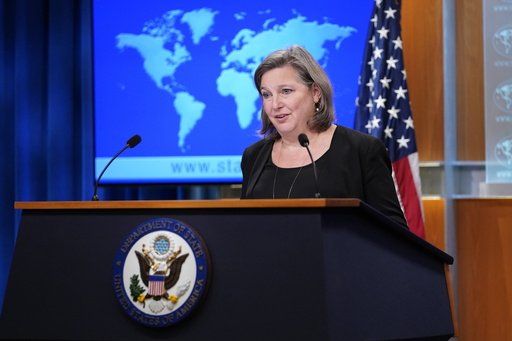WASHINGTON (AP) — Victoria Nuland, the third-highest ranking U.S. diplomat and frequent target of criticism for her hawkish views on Russia and its actions in Ukraine, will retire and leave her post this month, the State Department said Tuesday.
Nuland, a career foreign service officer who served as Assistant Secretary of State for Europe during the Obama administration but retired after Donald Trump was elected president, returned to government as Under Secretary of State for Political Affairs in the Biden administration.
She had been a candidate to succeed Wendy Sherman as deputy Secretary of State and had served as acting deputy since Sherman’s retirement seven months ago but lost an internal administration personnel battle when President Joe Biden nominated Kurt Campbell to the no. 2 spot. Campbell took office last month.
Nuland had served at the U.S. embassy in Moscow in the tumultuous 1990s and was in the city during the attempted coup against former Russian President Boris Yeltsin.
She then became U.S. ambassador to NATO before being tapped to serve as the State Department spokeswoman under former Secretary Hillary Rodham Clinton during President Barack Obama’s first term.
As the department spokeswoman and later as assistant Secretary of State for Europe, Nuland drew the ire of many Russian leaders for her outspoken defense of Ukraine, particularly after Russia annexed the Crimean peninsula in 2014.
Former Secretary of State John Kerry has recalled on numerous times that when Nuland left the spokeswoman’s job during his tenure to become the top diplomat for Europe, Russian Foreign Minister Sergey Lavrov congratulated him for “getting rid of that woman.” Kerry said he replied to Lavrov that he didn’t get rid of her, “I promoted her.”
Current Secretary of State Antony Blinken praised Nuland for her three and a half decades of public service and thanked her for her role in shaping U.S. policy around the world under six presidents and 10 secretaries of state.
“But it’s Toria’s leadership on Ukraine that diplomats and students of foreign policy will study for years to come,” Blinken said in a statement.
“Her efforts have been indispensable to confronting Putin’s full-scale invasion of Ukraine, marshaling a global coalition to ensure his strategic failure, and helping Ukraine work toward the day when it will be able to stand strongly on its own feet – democratically, economically, and militarily.”
The Russian foreign ministry immediately seized on the announcement, calling it an admission of failed U.S. policy toward Russia.
“They won’t tell you the reason,” spokeswoman Maria Zakharova said. “But it is simple – the failure of the anti-Russian course of the Biden administration. Russophobia, proposed by Victoria Nuland as the main foreign policy concept of the United States, is dragging the Democrats to the bottom like a stone.”
Nuland will be replaced temporarily as under secretary by another career diplomat, John Bass, a former ambassador to Afghanistan who oversaw the U.S. withdrawal from the country. He is currently the undersecretary of state for management.
U.S. officials said the favorite to succeed Nuland in a permanent capacity is the current U.S. ambassador to NATO, Julianne Smith, a one-time Pentagon official who also served as then-Vice President Biden’s deputy national security adviser.


